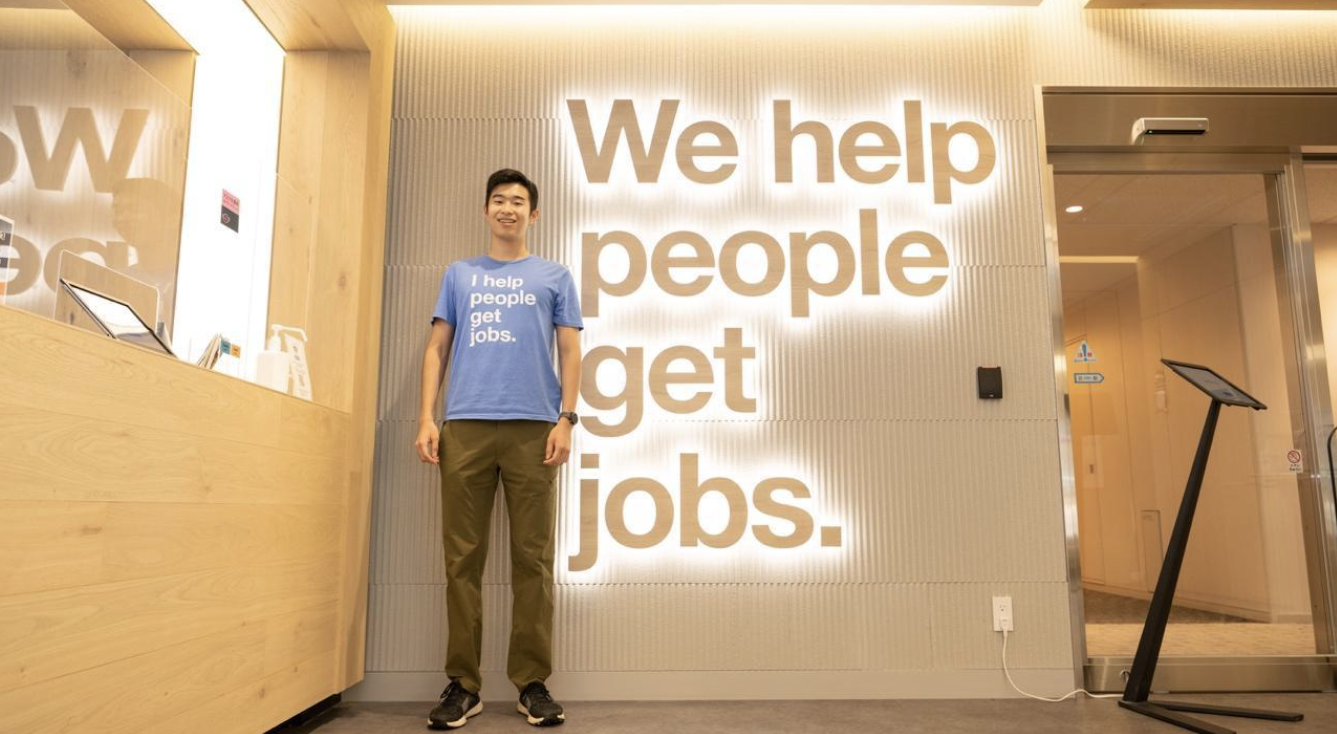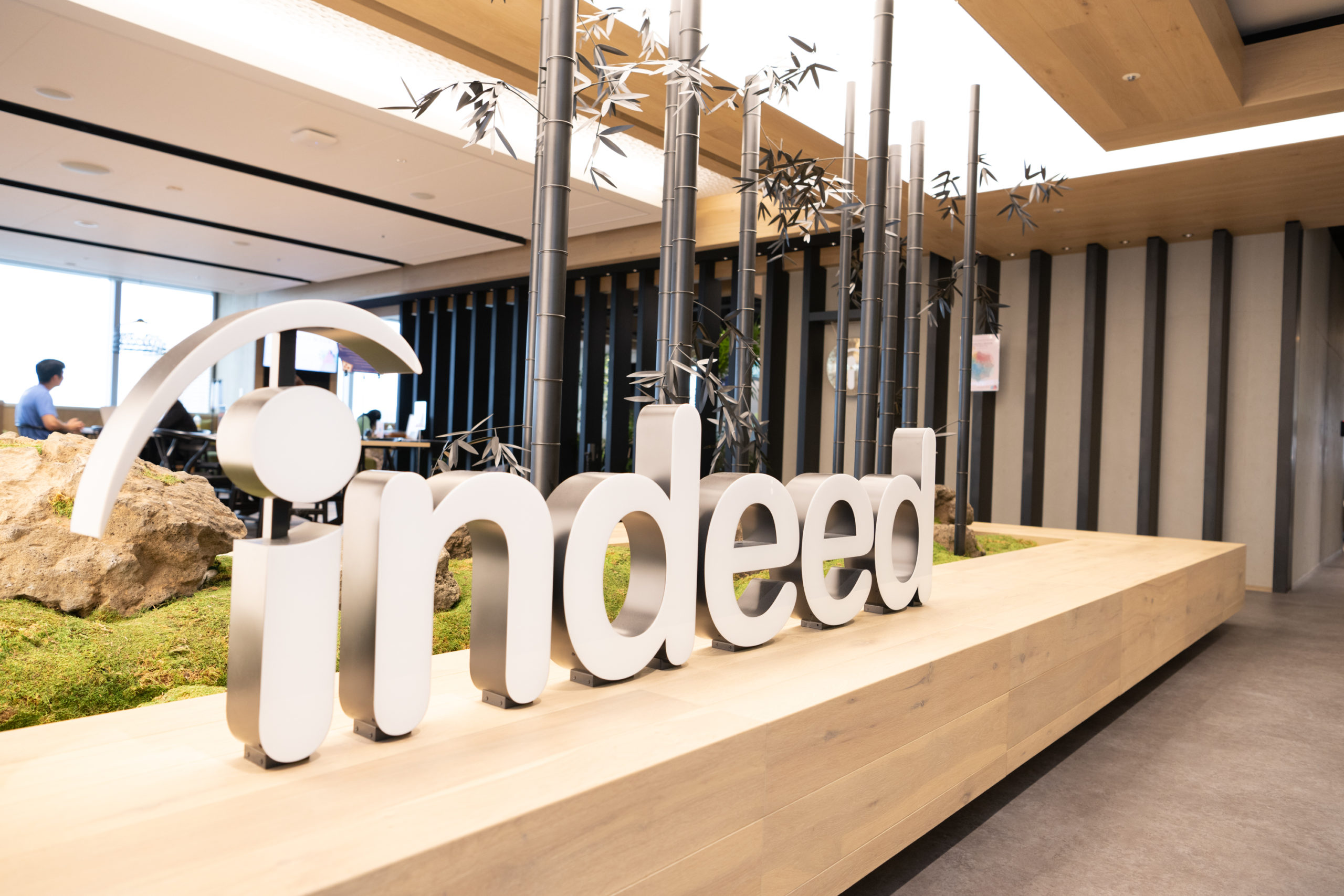Yuto joined Indeed in 2022 as a Business Intelligence Analyst for the Sales and Client Success teams. Before joining Indeed, he worked in strategy development and digital transformation (DX) at a consulting firm. He majored in Computer Science in college.
—

The role of a Data Analyst has become crucial in recent years, given the advancement of the Internet of Things and big data. Many companies are investing in specialist roles focused on data analysis.
At Indeed, the Business Intelligence (BI) Analyst collaborates with several teams, such as Sales and Client Success, to find solutions to problems. These experts sift through Indeed’s vast amount of data to devise new strategies.
We asked one of the BI Analysts who has been working as part of a global team analyzing data about Indeed’s culture, the diverse team, and the synergy through working with people from different backgrounds.
The appeal of a tech company
What kind of things did you study as a student?
I majored in computer science and economics at university. I was interested in the IT industry, so I interned at a few tech companies during the summer and got hands-on experience working on engineering teams. I mainly worked on improving search functionalities, but through my work, I learned that many more factors influence business operations beyond the product itself. To effectively enhance overall performance, I felt it was necessary to take a broader view of the business by getting experience in business management.
To achieve this, I joined an international consulting firm after graduation. Alongside strategy development for new businesses and organizational reform, I supported the implementation of digital transformation. By working with clients in a number of different industries, I learned how to solve the problems businesses face.
What made you decide to change jobs?
While working with many different clients, I became more interested in the tech industry. The tech industry has many advantages, such as swift decision-making and an open and communicative corporate culture. I thought back to my days as an intern and decided that I’d like to work in the tech industry again.
Why did you decide to join Indeed?
Indeed was one of the tech companies that I had been interested in since I was a student. When I came across the Business Intelligence data analyst role, I applied for the job right away. I was looking for a job where I could solve problems while analyzing and utilizing data.
At a user-focused tech company like Indeed, I can get closer to users than at consulting firms and can really feel the difference my team is making. I enjoy working hands-on to solve problems and influence key business decisions.
What was your interview like?
We discussed a variety of topics, including team culture and goals, and I was able to observe Indeed’s culture firsthand. The simple mission, “We help people get jobs”, runs through the entire company, and I was impressed by how an organization of this size is able to come together and grow in order to achieve this.
Since employees come from diverse nationalities and backgrounds, I felt it was the right workplace for me. I enjoyed working at a diverse, international company in my previous role and knew that I wanted a similar kind of work culture for my next job. Indeed was where I wanted to work, not just in terms of the role but also the environment.

Documentation culture makes learning on the job easier
What does your current role involve?
I use data to solve problems faced by various departments across Indeed. I belong to a team overseeing Japan and the rest of the Asia-Pacific (APAC) region within the BI structure. My day-to-day work is done with my team, but when a problem arises that can be solved using data, people collaborate with us to work on the project.
On the APAC team, we work with business-related departments such as Marketing, Sales, and Finance. There are also teams that collaborate with the Product department. You are able to see the whole company from a cross-departmental perspective.
Can you tell us in detail what sort of solutions you provide?
To give an example of our output, we create a dashboard, which allows you to get an overview of the progress toward reaching the annual or quarterly OKRs (Objectives and Key Results). Additionally, when a team structure changes, we run simulations to see the effect this might have on sales. When team members from other departments bring us in to help with a problem, we provide the necessary data and dive deeper into areas requiring more detail. Each team then utilizes this information to come up with a final strategy.
In terms of our methodology, we include automation tools to solve particular issues and reporting, among others. We get to know what each department is working on and drive projects forward while working with specialists from each field within the company.

Have you encountered any difficulties while learning the ropes?
As the documentation culture is so entrenched within the company, I haven’t encountered any difficulties. The onboarding process was all done online due to the COVID-19 pandemic. Still, I found it really easy to learn about the internal tools we use and developer environment using the easy-to-understand manual.
Before starting, I had anticipated that it would be 3 to 4 months before I got to work on projects, but I absorbed a lot through on-the-job training and the manual and took part in my first project after a month. I received detailed advice from my manager while working on the project, and now I’m able to take ownership too. It looks like it’s not just in Tokyo where new employees can find their feet quickly – the same applies to Indeedians across the globe.
How does your work style differ from that in your previous role?
In my previous role, we needed to produce results within a certain area, and I needed to implement already crafted plans. At Indeed, I’ve been working with no rigid framework at all. Even if we’re talking with a member of a team that we haven’t worked with before, if something sparks our interest, we often start working on a new project right away. We’re able to approach industry-related issues freely, which I find really interesting.
How do you think your skills have improved since you joined Indeed?
I’ve had the opportunity to have the code I’d written reviewed by our talented team members, so I feel that my technical skills are improving. By becoming a point of contact and listening to the concerns and problems of other teams, I feel that I’m developing my problem-solving and project-management skills.
Indeed is a company that emphasizes ownership, so being a data analyst doesn’t just mean crunching numbers. We also build various strategies to solve problems and communicate them to others as part of the job. Data analysts and engineers can play an active role in making business decisions.
We work together as a global team to find solutions
How do you communicate as an international team?
We have team members from various backgrounds, including people from the US, the Netherlands, and China, and the main language we use to communicate is English. We have a hybrid work pattern that mixes remote and office working, and we use business chat tools to ensure smooth communication. If there’s something we don’t understand, we can ask in the chat, and we’ll get an answer from a team member who’s knowledgeable on the subject.
Our team has an online “Learn and Tell” team-building session once every two weeks, where we can learn about what everyone else is working on. We provide updates on current projects and share opinions, and we sometimes talk about what’s going on within our personal lives as well. Even though I don’t get to meet the team much in person, it feels like we’ve gotten to know each other and can communicate naturally. Teams have their own team-building events; I know some teams even go bowling.
Have you ever faced any difficulties with your day-to-day communication?
I’ve never found it difficult to work in an international environment. On the contrary, an open-minded atmosphere allows you to think of new ideas and implement them more efficiently. I think it’s different from working in a Japanese company because there’s no sense that you have to read the room. Rather than assuming what others’ opinions or needs are, you need to put them into words and communicate. Indeed’s documentation culture is helpful too. You can use the manual and other tools to quickly understand the rules or structures that are the basis of the discussion.

For internal decision-making, who decides what and where is clearly laid out and documented. Thanks to Indeed’s high level of data transparency, you can quickly look up info that you need from a database, whereas, in other companies, you would need to ask other team members about it. This helps us complete our day-to-day tasks smoothly.
What are the benefits of working in an international environment?
One big advantage of working with people from various backgrounds is that it has allowed me to see things from a broader perspective. The international perspective can be really eye-opening, and I wouldn’t be able to do so if I were living an ordinary life in Japan. I was surprised to find such an international company in Tokyo.
What sort of systems and benefits are in place that make Indeed a good place to work?
There’s a culture throughout Indeed where every single team member has responsibilities and is autonomous, so it’s easy to get on with our day-to-day work. It’s not a one-sided system where work is being thrown our way from the other departments; instead, we constantly share our goals and problems. For example, although engineers and data analysts require different skill sets, we feel a sense of solidarity as we’re focusing and collaborating on the same goals and problems. There is a flat culture when it comes to sharing ideas, so you can work together as a team to solve problems.
At Indeed, we have benefits such as the monthly “YOU Day”, where the entire company gets one workday off, and “Open PTO”, meaning that as long as you have your manager’s approval, you can take as many days of paid time off (PTO) that you want. We are encouraged to take paid time off for our well-being, which is really great. I can see that my team is making the most of their paid time off while remaining committed to achieving results.
Committing to the growth of international markets in the mid to long term
How do you set goals as a team?
Our job is to support other teams, so we often link our goals to projects or to other teams’ goals. For example, if we’re collaborating with Sales on a Client Success project, we’ll give ourselves a set quantity to reach in order to help the Client Success team meet their objectives. We do not work only on projects with other teams, we can come up with our own suggestions and prioritize, taking into account how much of a business impact there will be.

Indeed’s company’s mission and vision permeate throughout the company – why do you think that is?
This might have to do with the leadership. We have a quarterly All Hands, where the company strategy and goals are communicated to all employees, and Chris Hyams, the CEO at Indeed, talks about objectives based on the company vision and mission. These meetings can be worldwide, but they are also split up by region. There’s even a Japan-specific Q&A session to better understand what the company’s leaders are thinking.
What kind of person would be a good fit for Indeed?
For anyone who wants to work autonomously and take ownership of their work, I can’t think of a better working environment than Indeed. You don’t just work with team members who are from Japan – there are a lot of people who join Indeed from outside Japan. Indeed’s corporate culture is one that embraces diversity, so I think people from all backgrounds can easily settle into work here.
What are your plans for the future?
To get more people in Japan using Indeed and contribute to the business’s growth. Hiring is difficult in the Japanese market, but if we utilize technology like AI, it paves the way for greater possibilities. We can also apply strategies that worked well in Japan to other markets, so in the medium to long term, we also hope to contribute to international market growth.



